Emergency Dentist Granby
Toothache or Dental Injury? We’re Here to Help!

If you break a bone, have a deep cut, or experience another injury or sickness, your first instinct is to go to the emergency room for help immediately. However, when it comes to a dental emergency in Granby, emergency rooms rarely have the equipment or training to handle these problems. Instead, come to Salmon Brook Dental. In fact, you should save our number in your phone and give us a call as soon as the dental emergency occurs for the best possible results.
Why Choose Salmon Brook Dental for Emergency Dentistry?
- Open Late and On Certain Saturdays
- Patients of All Ages Welcome
- Dental Insurance Accepted
How We Treat Dental Emergencies
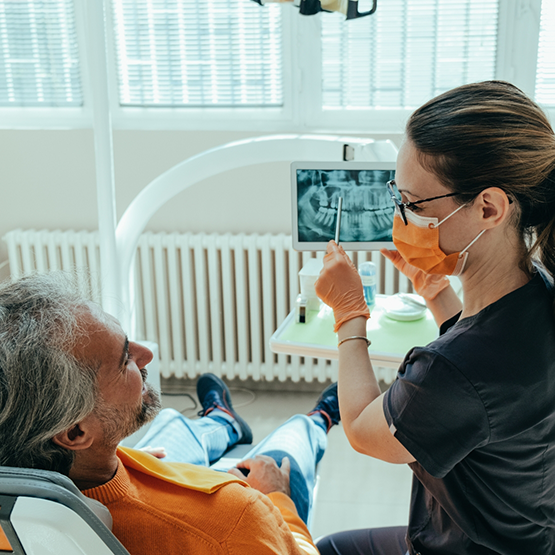
- Get an appointment scheduled fast: By getting in touch with our office, you’ll be able to speak with a team member about your symptoms and get an emergency appointment scheduled as soon as possible. Our dentists will do everything they can to get you seen the same day you call.
- Complete an emergency exam from our dentists: When you do arrive at our practice, we’ll get you into one of our operatories right away, then perform an emergency exam. This process may also involve the capture of digital X-rays depending on your symptoms.
- Review our findings and recommend treatment: We’ll go over our findings with you directly so you know exactly what’s going on with your oral health. Once we do, we’ll then recommend a tailored plan that involves multiple procedures, if necessary.
- Get the care you need: Whether you need a dental filling, crown, root canal therapy, or another service, our team members at Salmon Brook Dental will work quickly to get you out of discomfort and your oral health back to normal.
The Most Common Dental Emergencies
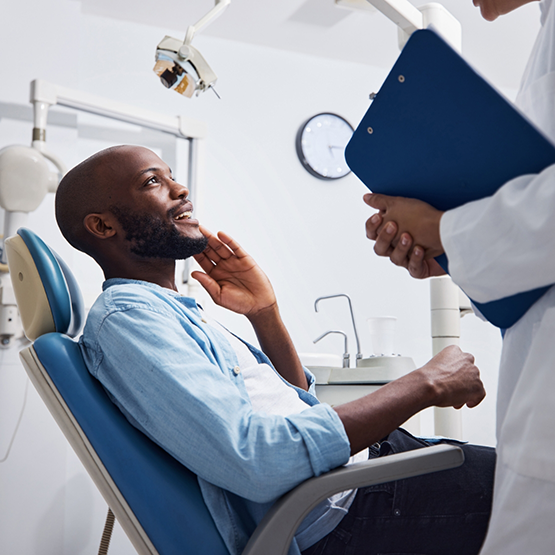
Although panic or fear can set in when a dental emergency happens, try to stay calm. You don’t have to figure it out all by yourself. If you’re ever in a dental emergency, call our team. Not only will we be able to give you advice for your specific situation, but we can also schedule an appointment for you quickly, relieving your pain and returning your smile to full health. Until you come to our dental office, there are things you can do to increase your comfort or prepare for your visit.
Understanding the Cost of Emergency Dentistry
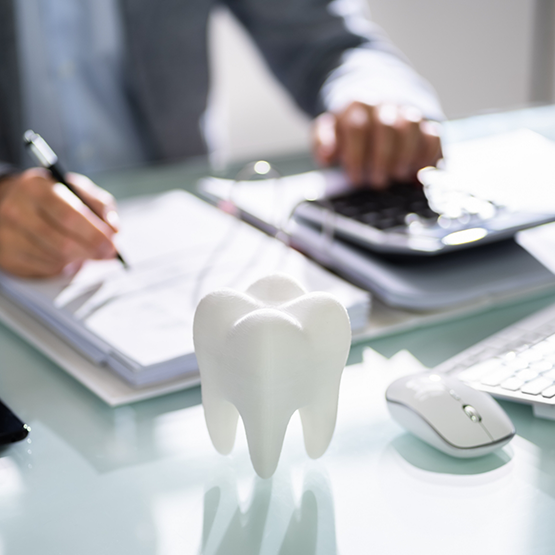
When faced with a dental emergency, the last thing on your mind is how much it will cost to treat it. At Salmon Brook Dental, we want your focus to remain solely on repairing the problem and leaving with a healthier, happier smile, but we understand the financial responsibilities of dental work can determine how you choose to fix the issue. Below you will find more information about the factors that can contribute to the overall cost of emergency dentistry in Granby as well as what payment options are available. If you have additional questions or would like to schedule an appointment, contact our office today.
Every Dental Emergency Is Different

Not all dentists are the same and neither are dental emergencies. While some may only require a quick filling, a more serious injury might result in dental implants or other tooth replacement solutions. To better understand your overall treatment costs, you can expect your emergency dentist in Granby to evaluate the following factors:
- The severity of your dental emergency
- The type of restorative care you will need (i.e., antibiotics, dental crown, root canal therapy, tooth extraction, etc.)
- If you have dental insurance you plan to file with
Only until you schedule an appointment to see a member of our team will we be able to provide a clear estimate, so you have a better understanding of your expected costs.
Does Dental Insurance Cover Dental Emergencies?

At Salmon Brook Dental, we are pleased to be in-network with an array of dental insurance providers, and we will help to maximize your benefits and minimize your out-of-pocket expenses. Most companies will cover at least one emergency exam per year, but it’s important that you check with your insurance carrier to verify whether this is valid for your plan.
The real cost, however, comes with the type of restorative care you need. Since most carriers agree to cover between 50-80% of the total cost (depending on whether you’ve met your deductible and how much remains of your annual maximum), you can breathe a sigh of relief when using your dental insurance to cover your emergency treatment.
Other Options for Making Dental Emergencies Affordable
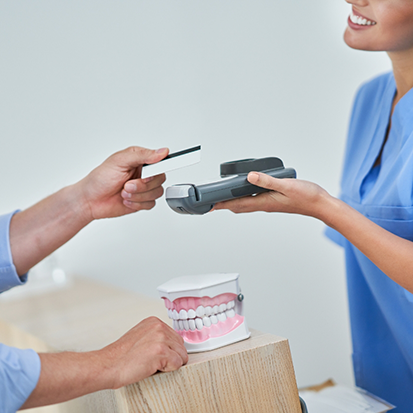
If you are uninsured or need help in paying the remaining balance after filing with your insurance, we also work closely with CareCredit, which is a third-party financier who offers low and no interest payment plans to help you stay within your budget.
Taking Care of Your Smile Can Save You Money
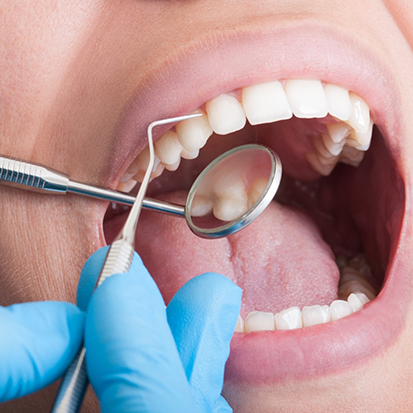
If you suddenly fall while walking to your car after leaving the office or accidentally stumble while playing tag with your kids and suffer a chipped or broken tooth, you cannot necessarily avoid these types of dental injuries. However, those that result in a serious toothache or infection can be prevented.
Apart from maintaining an optimal oral hygiene routine, you must also commit to seeking immediate dental care at the first sign of a problem. Allowing pain to worsen or “minor” damage untreated will only lead to worsening oral health and costlier procedures.
By choosing to be proactive about your dental health, you can avoid unexpected trips to the dentist as well as keep more money in your pocket.
Keys to Preventing Dental Emergencies
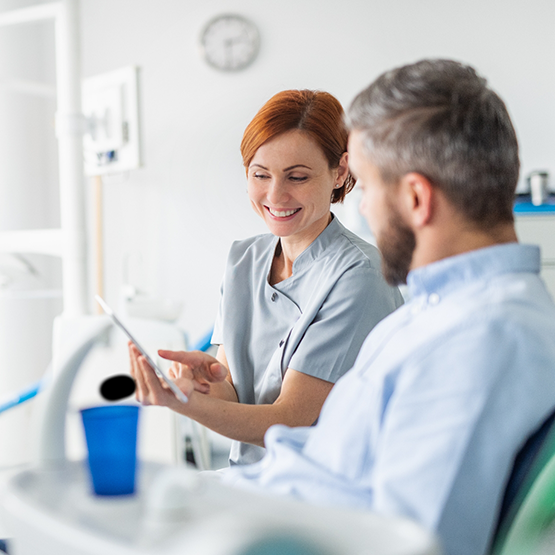
While it’s impossible to protect yourself from dental emergencies with 100% certainty, there are some steps you can take to minimize your risk of an urgent dental situation. It’s always best to be proactive rather than reactive. Keep reading to learn some easy ways to prevent dental emergencies in Granby!
Visit Your Dentist Regularly
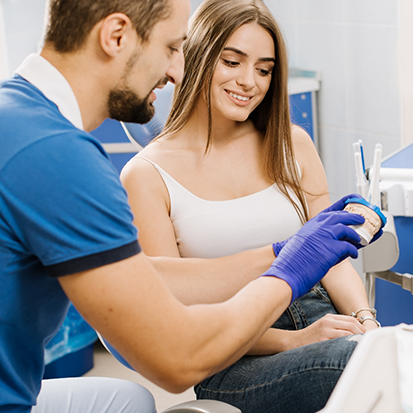
The American Dental Association recommends that you visit your dentist at least twice a year for routine checkups and cleanings. These appointments are vital because they allow a professional hygienist to remove and clean away plaque that you couldn’t get to at home, reducing your risk of dental issues. Additionally, checkups give your dentist a chance to catch any problems while they are still small, protecting you from more extensive, expensive, and painful dental emergencies in the future. This is also a great time to ask us any questions you may have about your oral health.
Maintain Good Oral Hygiene at Home
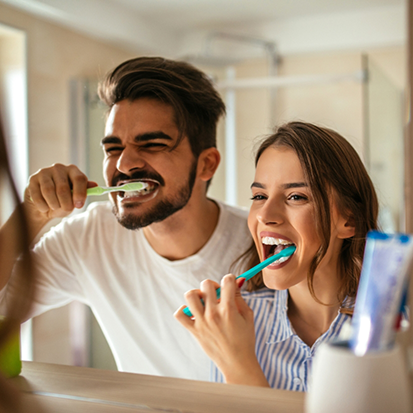
Your first defense against dental emergencies is your at-home oral healthcare routine. Make sure that you’re brushing twice a day for two minutes each session. Angle your brush at 45-degrees and pay close attention to your gumline for the most thorough cleaning. Also, floss once a day to remove pesky bits of food and plaque that get stuck between teeth. For an extra layer of cleaning, use alcohol-free mouthwash. This is a great step if you have trouble cleaning your tongue or reaching various parts of your mouth.
Eat a Nutritious Diet

The types of foods you eat can directly impact the health and strength of your smile. Do your best to avoid foods that are extra sugary, acidic, sticky, or hard because these items can harm your teeth over time. Instead, choose fruits and veggies! These foods act as natural toothbrushes, scrubbing away plaque while also stimulating saliva flow to wash away bacteria. Additionally, a diet rich in calcium and vitamin D will keep your smile strong.
Wear a Mouthguard
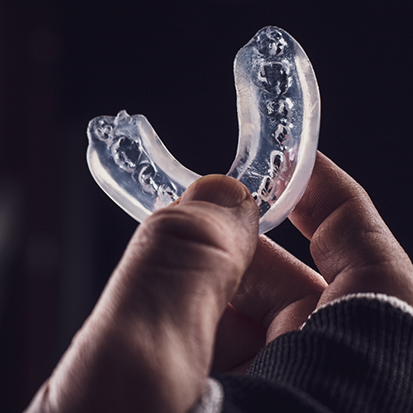
Dental emergencies are automatically more likely to occur during sports or activity, whether you consider them physical or not. That’s why you should always wear a mouthguard to protect your teeth. Our custom-made mouthguards are comfortable to wear, and they reduce the chance of dental injury and concussion if there is a blow to the face. Additionally, you should wear a nightguard if you grind your teeth. This habit can eventually weaken your smile and cause it to crack.
Use Tools to Open Packages, Not Your Teeth

It can be tempting to use your smile to rip through packages or open bottles. However, this is a quick way toward a cracked or damaged tooth. Only use your teeth for chewing, speaking, and smiling. Additionally, do not chew on non-food items like pens or ice cubes because these can crack your grin. We recommend keeping a pack of sugarless gum on you so you can chew it instead of forming other habits that can harm your smile.
Dental Emergency FAQs
What should I do if my mouth won’t stop bleeding?
Start by cleaning the area with water. From there, you can apply a cold compress directly to the wound. This will work to reduce any swelling that is present. If the bleeding stops after applying pressure, come to our office. However, if the bleeding does not stop after performing the previous steps, you are likely better off visiting the emergency room in this instance. Once you have stabilized, you can come to our office for a more detailed examination.
Will my dental emergency get better over time?
In most cases, dental emergencies do not get better on their own. Unfortunately, dental emergencies are not like the common cold or minor abrasions, both of which tend to heal or go away after enough time. When a tooth is cracked or it hurts, it continues hurting or remaining damaged until it gets treated by a dentist. Remember, the sooner you get treated, the more likely your costs will be lower overall.
If my child knocks out a baby tooth, do we still need to come?
Yes. Unless it was very loose to begin with, baby teeth are not supposed to come out too early. If your child is experiencing a large amount of pain after the tooth comes out, that’s another sign that they need to see an emergency dentist right away. They may need to have a spacer placed in order to prevent the adult tooth from erupting too soon.
How can I safely remove objects from between teeth?
Under no circumstances should you be using a toothpick or other sharp objects to remove foreign materials from in between teeth. While we mentioned that you should slide floss from in between your teeth, you can also combine one half teaspoon of salt and one glass of warm water to create a saltwater mixture. Rinse your mouth out with this mixture to effectively loosen the material without using sharp objects.
